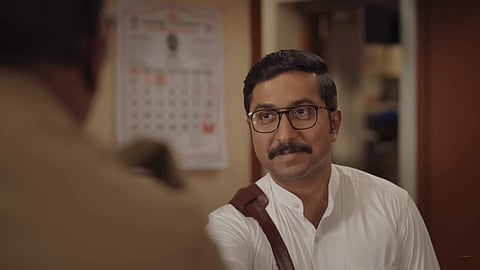

Look, I love feel-good films as much as the next person. I like it when a film occasionally reminds me that good people exist and good things can happen (to those who wait or don't). But I also wanted to be reminded that the world is not always Shangri-La; that there exist evil people who sometimes win. Abhinav Sunder Nayak's Mukundan Unni Associates -- from hereon, I'm going to mention the film's title and the director's name together because that's how it shows up in the movie, more than once -- is the film that reminds you of the latter. The film reflects the narcissism and indifference of its titular character, along with his meticulousness and the immaculate manner in which he carries himself.
Director: Abhinav Sunder Nayak
Cast: Vineeth Sreenivasan, Suraj Venjaramoodu, Tanvi Ram, Arsha Baiju
It's a film where the bad guy gets the girl and the good guy -- wait, scratch that: there are no 'good' or 'bad' people here, just grey. It's a film where Grey Guy #1 has to see Grey Guy #2 throw, into the dustbin, the PSC entrance prep book the former just gifted the girl he wants to woo. It's a film that dislikes following the rules. It's a film that tells you, through one of its characters, that motivational books that preach that hard work and perseverance are the keys to success are trash. But I guess Paulo Coelho is an exception because when Mukundan Unni (Vineeth Sreenivasan) wants something, it often seems the universe is conspiring to help him achieve it, even if acquired through unethical means.
Abhinav Sunder Nayak's Mukundan Unni Associates presents the actor inside Vineeth Sreenivasan in his most restrained and confident form. The first-person narrative puts us inside Unni's head, making you privy to all his thoughts, fears, celebratory moments, his next move, and his appraisal of every person he meets. He even converses with a 'ghost' and remarks that "this hallucination is extremely annoying." Most people around him are able to figure out what he is because he is too obvious. Sometimes the realisation comes too late. On a few occasions, he gives a piece of his mind, like telling his junior he dresses like a bum. Yes, a lot goes through his head, but at no point did I feel like I couldn't endure his monologues with us.
Unni rarely smiles in the film; when he does, he has to force himself. He doesn't laugh. He often utters his lines with a deadpan expression, but only we know what he is going through. In one scene where he indulges in psychological manipulation, his speaking manner almost feels like the hiss of a snake. That reminds me: a snake shows up at a crucial moment, and Unni employs its services for his nefarious plan for domination. In that sense, he is almost like a James Bond villain. (Ophidiophobic viewers needn't worry; it doesn't show up often.)
Abhinav Sunder Nayak's Mukundan Unni Associates is also the most visually inventive film since Thallumaala. It puts as much thought into the presentation as it does the performances. Even its opening cards are outputs of admirable inventiveness. The 'Cigarette smoking is injurious to health' and 'No animals were harmed' cards come in a combination of yellow and black, along with an animated makeover that made me chuckle. The same goes for informing audiences of the 4:3 aspect ratio choice: as the frame fills up the screen, Vineeth's voiceover says, "This is a full screen, but only this much is enough," as the screen magically shrinks itself to 4:3. Another card follows: "Most people are grey, except in some cases. In some cases, they are just black."
At times, it relies on animated illustrations to explain some of Unni's ideas; at others, we get time-lapse footage, jump cuts, collages, or disorienting camera tilts and zooms to give us a sense of the passage of time, or a character's state of mind. After a certain point, the 4:3 aspect ratio disappeared, and it took me a few minutes to realise that it was now a full screen. Suffice it to say Abhinav has put his editing background to good use. Cinematographer Vishwajith Odukkathil's brown and beige-dominated frames carry much elegance and keep their focus firmly on the characters. Sibi Mathew Alex's appropriately placed score alternates between playful and menacing and is never intrusive.
The film's ideological standpoint may bother some, but it didn't me. I found its sensibilities similar to Fleabag -- not in terms of character description -- there is no similarity there at all -- but in the way it accepts its main character as it is instead of trying to make a moral statement. One can find the protagonist's actions disagreeable and still watch it as an unapologetic and amusing portrait of the character. It just wants to say, "This is how the real world is. There exist characters like Unni." Where, then, is the lie?